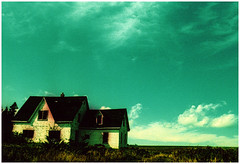MacWorld identified Flickr as “Hot Stuff” in their January 2005 issue. (I love the “Jobs talks with reporters” picture of Steve Jobs included as an illustration!).
But I also wanted to link to two great blog posts about Flickr. The first one is from Clay Shirky, Flickr As Web Services, and he describes how ITP, where he teaches, is in the grip of a full fledged Flickr addiction, which he illustrates with the following two examples:
First, one of our students, after working on the floor late one night, headed home, and in the time it took to walk the 4 blocks between ITP and his apartment, another group whiteboarded a goodnight message to him, snapped a photo of it, and uploaded it, knowing that he would check Flickr the minute he got home, and that their photo would show up in his stream.
Flickr is nominally asynchronous, but has achieved, at least at ITP, a kind of social near-synchrony. Everyone who’s used email for longer than a month knows the mental calculation of ‘email vs phone’, as in “I need to reschedule a meeting happening N hours from now. Will they check their email, or should I call?” The more email-driven a person is, the lower N can be before email won’t work. This group is so camera-centric and Flickr-obsessed that that N for Flickr is sub 1 hour.
Another story: one of our students doesn’t have a laptop, digital camera, or cameraphone. (At ITP, this is, in terms of ostentation, roughly akin to wearing a feather boa to work.) She is nevertheless a Flickr user, participating in the service by uploading screenshots from school. When the service has become so essential to social life that not having a camera isn’t enough to keep people from participating, you know something is up.
He also makes some interesting observations about people being more likely to pay for a personal service than to be a member of a community, which I think is true, and he notes that Flickr shoulders a lot of the hosting costs for photos appearing on weblogs and other sites, to which I respond that since all the sites we’re hosting photos for are personal, and not commercial, as per our terms of service, the bandwidth doesn’t end up being that expensive, and the TOS also require a link back to Flickr in exchange for the hosting, which helps get the word out.
Next, there is a great post on Antenna in which the author, Nadav, decides that Flickr is a MMORPG, notes that we had, prior to Flickr, been building an online game (the much-missed and beloved GNE):
…for some reason I was tricked into thinking it was more like iPhoto crossed with Friendster than Ultima Online.
Why does this make Flickr successful where Friendster, Orkut, et al fall flat? I believe it’s because flickr’s designers are among the first (I can’t think of others but they surely exist) who have grokked video game design and (more to the point) figured out how to translate it to the web. What does this mean? It means that, unlike say Zoto, which is just a tool for storing and sharing photos, Flickr is inherently, down-to-its-bones about play. If you look at a list of the elements of a successful game, they are all present in Flickr: a sense of space to explore, a range of challenges, a range of abilities which can succeed, the need for preparation and skill, a variable feedback system.
Read the whole thing, I think that he’s on to something here.
And while you’re at it, look at these cool cross-processed photos from the yoush, from a photoset called X processed:

